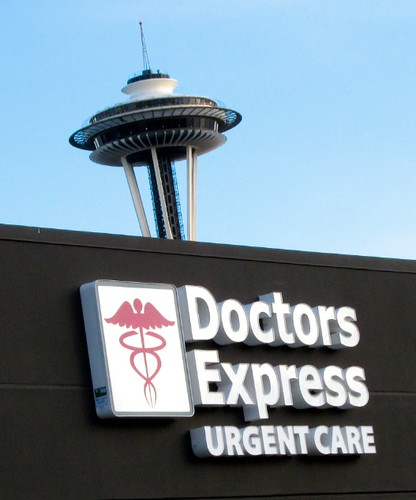
As winter ends and spring pollen fills the air, Dr. Michael Sthay of Doctors Express is still seeing a lot of patients with sinusitis and congestion. Here is some practical advice how to best treat it, and why antibiotics aren’t always recommended.
Treating Acute Sinusitis
Many of us develop Acute Sinusitis, or sinus inflammation, as a result of a cold or flu. It can be a miserable experience, with pain, congestion and drainage lasting 1-4 weeks. However, multiple studies over the past 20 years have shown that patients with this problem do not benefit from antibiotics unless they have had symptoms for longer than 4-6 weeks. In general, it’s a good idea to avoid antibiotics unless absolutely necessary, due to the many possible side effects and the potential for those antibiotics to be come less effective for you over time.
This is intended to be a practical guide to help you combat sinusitis and prevent serious infection. The key is to relieve pressure and provide drainage:
Add Humidity to Your Environment to open sinus passages, shrink nasal membranes and thin out secretions.
- Put on a kettle or pan of water to steam, use a vaporizer or humidifier (and keep it clean!).
- Use a surgical mask, or even a bandana, to trap moisture from your breath when you exhale.
- Try simple nasal saline sprays (salt water, not medicated spray), which also have the additional benefit of washing your nasal passages. That process may be repeated 6-8 times a day.
Increase Fluid Intake, especially of hot liquids.
Elevate Your Head at Night with an extra pillow. This has the added benefit of decreasing facial pressure.
Take Mucinex, which is available over the counter. It helps thin mucous as well as bronchial secretions. Plain Mucinex is preferable, without decongestants or cough suppressants, and should be taken twice daily.
Nasal Decongestant Sprays can be very effective if used properly. Here are a few ways to improve effectiveness:
- Use a 12-hour pump sprayer that provides a better, measured amount of spray and a finer mist.
- Before use, gently blow your nose or use steam to shrink membranes. This will allow the spray to travel further.
- Spray one nostril at a time (one or two sprays) and gently sniff the spray up until you feel it at the back of your throat (you may sense a tingle, burn or taste).
- Gently blow it back out to minimize the amount in your throat and avoid an irritated, dry or raw sensation in your throat. After you blow it back out, repeat the same process on the other nostril.
- Do not use more than twice a day, and never more than 4-5 days or your nose will get used to the medicine and remain stuffy without it.
- Continue to also use saline sprays, but wait 15-20 minutes after decongestant spray.
Allergies May Increase Nasal Swelling, which causes symptoms to worsen. Other medications may be needed to address the allergy issue, so your sinuses can start draining.
Tylenol or Advil may be taken to relieve pain and pressure.
Oral Decongestants May have Benefit, but may also raise blood pressure, add anxiety, increase heart rate and risk of arrhythmias, and may cause sleep and urinary difficulties, especially in men.
Avoid Flying, if possible. Air in planes is very dry, and change in altitude may cause significant pain. If you must fly, wear a mask to trap moisture.
Avoid Wood Stoves, Forced Air. Cold winter air is dry, so adding moisture is even more important in the winter. During the summer, try avoid air conditioners if you are congested.
Avoid Antihistamines, which can dry or thicken secretions.
Overall Precautions
If fever develops, or a headache persists despite the above treatments, follow up with your doctor for re-evaluation. There are other causes of sinus pain such as dental issues, migraines, allergies and other more serious problems, and some of these DO require antibiotics. Your doctor should be able to determine if antibiotics are truly needed. You should be seen if high fever is present as this may indicate other conditions are present in addition to acute sinusitis, which require immediate attention.
Michael Sthay, MD
Medical Director
Doctors Express in Seattle
Lower Queen Anne
www.DoctorsExpressSeattle.com


